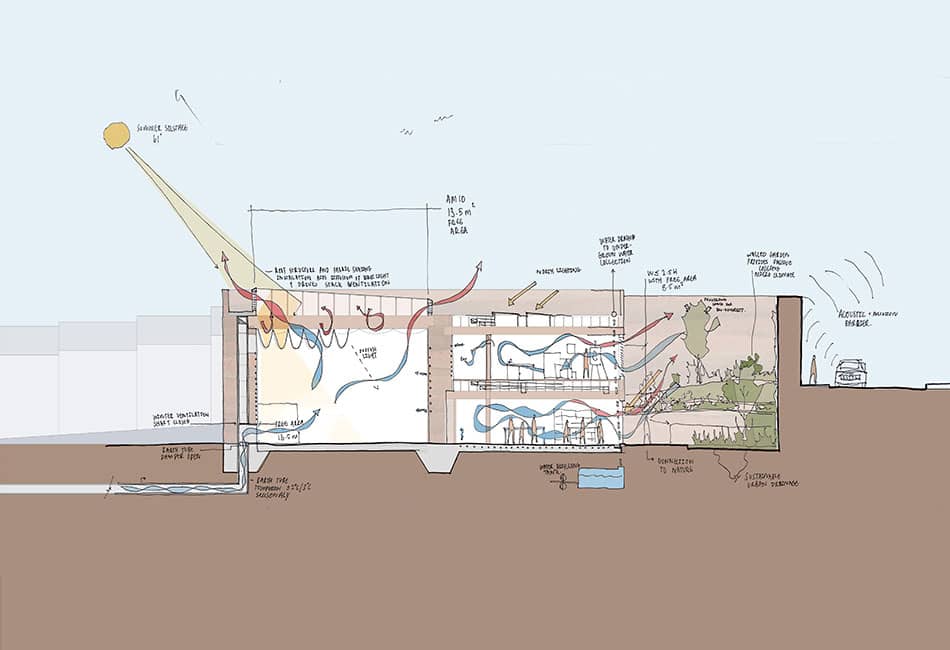
BEng(Hons) Architecture and Environmental Engineering (with Foundation Year)
This course is open for applications
92% of Architecture students are satisfied with the teaching of their course overall.Guardian University Guide 2026
About
Our accredited degree in Architecture and Environmental Engineering, with focus on sustainable, high performing buildings. Graduates have a wide choice of career options including architecture, environmental services engineering, or sustainability consultancy.
Why study architecture and environmental engineering?
Our innovative five-year Architecture and Environmental Engineering course combines creative design with scientific problem-solving, preparing you to tackle the challenges of today's built environment. Blending architecture with environmental engineering gives you a broad perspective and skillset.
You'll explore topics from architectural history and social value to climate resilience and building performance - light, sound, air quality, and thermal comfort - developing the tools to design sustainable, impactful spaces for diverse communities. You'll also gain experience with the latest technologies and design methods to shape the future of architecture and engineering.
Why UWE Bristol?
Study in one of the UK's most vibrant cities, where pioneering architecture and a dynamic professional community will fuel your real-world learning activities. You'll get hands on in labs dedicated to building physics and materials analysis within our sustainably designed architecture studios and modern School of Engineering.
Benefit from strong employer links and career support through internships, part-time work, and graduate job guidance.
Our courses are professionally accredited across the built environment, giving you a competitive edge.
As an Architecture and Environmental Engineering student, you'll also have a chance to play a key role in the Architecture Society and Built Environment Society.
Learn from students from other years and disciplines as you pursue meaningful student-led initiatives.
You'll also showcase your work to industry professionals at our final year Degree Show, offering potential employment opportunities after graduation.
Where can it take me?
As an Architecture and Environmental Engineering graduate, you'll have the flexibility to choose from a broad range of career options. Accredited by Chartered Institution of Building Services Engineers (CIBSE), you'll have access to careers covered by these industry body and RIBA Part 1 (Royal Institute of British Architects).
You'll also develop transferable skills that open doors to alternative careers in design, sustainability, energy, water, and project management.
Many pursue further study, including our Master of Architecture, MSc Façade Engineering or MSc Building Information Modelling courses.
The image above shows the fantastic work from one of our students (Tyler Curley-Smith, 2023 Architecture and Environmental Engineering graduate).
Watch: Welcome to the School of Architecture and Environment at UWE Bristol
Entry
Typical offers
You will need to meet the following Level 2 requirements:
- GCSE: Grade C/4 in English and Mathematics, or equivalent.
In addition to the above Level 2 qualifications, you'll need to achieve the published tariff points from your Level 3 studies prior to entry. Below is an indicative list of the main qualification types. However, we will consider any Level 3 qualifications towards meeting our entry requirements.
- Tariff points: 88
- Contextual tariff: See our contextual offers page.
- A-level subjects: No specific subjects required.
- EDEXCEL (BTEC) Diploma: No specific subjects required.
For information on required Guided Learning Hours please see our minimum entry requirements page.
- Access: No specific subjects required.
- Baccalaureate IB: No specific subjects required. We accept the IB Career-related Programme in conjunction with other Level 3 qualifications.
- Irish Highers: No specific subjects required.
- Welsh Baccalaureate: We accept tariff points achieved from the Advanced Skills Baccalaureate Wales in conjunction with other Level 3 qualifications.
- Cambridge Technical: No specific subjects required.
- T Levels: No specific subjects required.
Entry requirements
If you exceed the entry requirements you may be eligible for BEng(Hons) Architecture and Environmental Engineering.
International applicants
If you are an international student your recommended route of study for this degree is through our International College, which upon successful completion to the required level and with good attendance, guarantees entry to Year one of the degree.
Read more about entry requirements.
How to apply
Read more about undergraduate applications.
For further information
- Email:
UK applicants
Admissions@uwe.ac.ukInternational/EU applicants
International@uwe.ac.uk - Telephone:
UK applicants
+44 (0)117 32 83333International/EU applicants
+44 (0)117 32 86644
Structure
Content
Year zero (foundation year)
You'll study:
- Context of Design and Development
- Foundation Design Communication
- Foundation Design Studio
- Foundation Engineering
- Foundation Mathematics for the Built Environment.
You normally need to pass your foundation year before going into Year one.
Year one
You'll study:
- Contexts of Architecture 1 - Cities and Society
- Studio 1.2 - People and Environment
- Studio 1.1 - Form and Context
- Professional Principles and Digital Practice
- Materials and Environmental Physics.
Year two
You'll study:
- Passive Design Studio
- Studio 2.1 - Living
- Architectural Acoustics
- Building Services Applications
- Collaboration and Coordination
- Contexts of Architecture 2 - Histories and Theories.
Year three
You'll study:
- AEE Studio 3.2
- AEE Studio 3.1
- Energy Performance and Retrofit
- Critical Contexts
- Zero Carbon Buildings.
Final year
You'll study:
- AEE Studio 4
- Building Services Innovations
- Interactive Systems and Comfort Controls
- Employability, Ethics, and Enterprise.
The University continually enhances our offer by responding to feedback from our students and other stakeholders, ensuring the curriculum is kept up to date and our graduates are equipped with the knowledge and skills they need for the real world. This may result in changes to the course. If changes to your course are approved, we'll inform you.
"I got the chance to go on an engineering research trip to Hong Kong, which I really enjoyed. After graduating, I started working for a consultancy as an Architectural Assistant, and I'm now working for a larger firm, Pad Design, in Bristol." Ayo-Oluwa, Architecture and Environmental Engineering graduate.
Learning and Teaching
Our experienced teaching staff are active in research and professional practice, ensuring you learn about the latest ideas and trends in the industry.
You'll spend 12-16 hours a week engaging in face-to-face activities, including studio work, lectures, seminars, and field visits, supplemented by independent learning.
Through this mix of scheduled teaching and self-guided study, you'll explore themes like sustainability, urban design, and building technology. With an emphasis on hands-on learning and real-world application, the course blends studio-based teaching, technical workshops, and live design projects, allowing you to apply theory to practical contexts.
Your fieldwork offers exposure to diverse built environments, enriching your understanding of architecture and engineering. You'll also gain practical experience through site visits, internships, and community-based collaborations with local employers.
See our full glossary of learning and teaching terms.
Assessment
Our assessment strategy combines architectural creativity with engineering precision, focusing on real-world application and critical thinking.
You'll create portfolios showcasing your creative, technical, and analytical work using industry-standard software like CAD, BIM, and energy modelling tools.
Assessments include interdisciplinary projects, technical and laboratory reports, oral presentations, and poster sessions. You'll engage in live projects and case studies, working directly with community and industry stakeholders.
Through group work and collaborative assessments, you'll hone your teamwork and project management skills.
Exams and computer-based tests evaluate your foundational knowledge of architectural theory, engineering principles, and maths skills.
Your final-year capstone design studio project will combine your accumulated learning, requiring you to deliver a comprehensive architectural and engineering solution to a real-world practical challenge.
Learn more about assessments.
Fees
Full time course
Indicative Additional Costs
Supplementary fee information
Additional costs are for items you could need during your studies that aren't covered by the standard tuition fee. These could be materials, textbooks, travel, clothing, software or printing.
Features
Professional accreditation
Our BEng(Hons) Architecture and Environmental Engineering offers you accreditation, meeting the Chartered Institute of Building Services Engineers (CIBSE) standards for Incorporated Engineer status and the Royal Institute of British Architects (RIBA) Part 1 requirements for architecture.
The course also prepares you for master's courses validated by the Architects Registration Board (ARB), ensuring you're well-equipped for professional recognition and further study.
Placements
There's no compulsory work placement on this degree, but we strongly encourage you to get experience through work or internships during vacations.
Experience also hones your skills, industry knowledge and professional network, making you an attractive graduate.
Fieldwork
We arrange day trips so you can visit study locations and meet people that can inform your work. We also arrange residential field trips locally, nationally and internationally.
Stonewater design project trip
A group of our Year two students had an exciting opportunity to showcase their dwelling projects to Stonewater Housing Association. The project brief asked students to design collective housing for Black, Asian, or Minority Ethnic groups in Bristol. Students were asked to take a progressive approach in their design demonstrating an understanding of how different cultures live. Eight finalist students presented to staff at Stonewater and the winning student, Leandro, was offered 2-weeks' paid work experience as a prize. Due to the success of this partnership, we're working with Stonewater and hope to collaborate with them on an ongoing basis.
Study facilities
Learn in modern facilities, including design studios and dedicated project rooms.
In specially designed buildings, get hands on in labs dedicated to low carbon design and construction materials.
Develop CAD, model-making, design, and drawing skills in integrated studios. Create architectural models using laser cutters, computerised routers, and wind tunnels, or in wood, metal, and concrete workshops.
Conduct spatial enquiries and analyse data with industry-standard GIS and statistical software.
Learn more about UWE Bristol's facilities and resources.
Take a personalised virtual tour of the Architecture facilities and experience what a typical day could look like here for you.
Personalised virtual tour
There's no need to visit us in person to explore our facilities and campuses. Take a personalised virtual tour and discover it all for yourself from wherever you are.
Take a virtual tourCareers
Careers / Further study
Graduates of our BEng(Hons) Architecture and Environmental Engineering (with Foundation Year) are well-prepared for a broad range of careers. You'll gain dual professional qualifications, meeting the requirements for RIBA Part 1(subject to validation) and CIBSE standards for Incorporated Engineer status. This dual accreditation will set you on the path to becoming a registered architect or building services engineer.
Studying sustainability, inclusivity, and innovation will make you an asset to employers who are addressing global challenges like climate change and urban resilience. You'll develop design skills that you'll be able to apply to broader environmental, social, and economic contexts, enabling you to think critically and creatively.
Hands-on learning through studio work, live projects, and community collaborations ensures you graduate with practical experience and professional readiness. You'll engage with real-world issues, working directly with planning agencies, industry stakeholders, and local communities to develop critical professional skills.
Whether you choose to specialise in architecture, engineering, or a combination of both, you'll have the foundation to pursue an impactful career. Our course prepares you to address the needs of society, clients, users, and the environment, drawing on the interdisciplinary strengths of our School of Architecture and Environment.
Our graduates are known for their ability to integrate architecture and engineering seamlessly, creating context-sensitive solutions. You'll be prepared to design inclusive, healthy, and sustainable places for future societies, making meaningful contributions to the built environment.
As an architect, you could go on to work in private practices, design firms, or government agencies, creating innovative and sustainable buildings. Your engineering skills will open doors to roles in building services, environmental consultancy, and renewable energy sectors, where you'll design systems that enhance building performance and sustainability.
Get inspired
Our award-winning careers service will develop your employment potential through career coaching and help you to find graduate jobs, summer placements and global opportunities.
We can also help you to find local volunteering and community opportunities, provide support for entrepreneurial activity and get you access to employer events.
Visit our employability pages to learn more about careers, employers and what our students are doing six months after graduating.
Watch: Take a look at the Engineering building
Step inside our School of Engineering building at UWE Bristol.
Life

Accommodation
An excellent range of options for all of the Bristol campuses and the city centre.

Bristol
A stunning city for student living with all the qualities to make you want to stay.

Sports, societies and activities
There is more to your experience here than study. Choose to make the most of it and try new things.

Health and Wellbeing
We provide support in the way you need it.

Campus and facilities
Discover our campuses and the wealth of facilities provided for our students.


